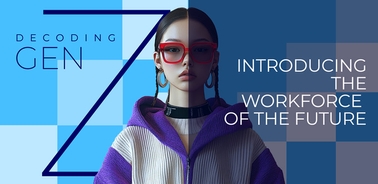- Home
- News & Events
- News
- Decoding Gen Z: The Workforce Of The Future
Decoding Gen Z: The Workforce of the Future

Keys to Attract and Retain the Youngest Generation of Talent.
In an era characterised by rapid technological advancement, social change, and economic uncertainty, Generation Z – born between 1997 and 2012 – is entering the workforce with a distinctive mindset, set of skills, and expectations. Projections indicate that by 2025, this generation will comprise 30% of the global population and is expected to represent 27% of the workforce. The question therefore arises as to the identity of this generation and the reasons why employers should pay particular attention.
"We are very aware that our employer partners want to bring out the very best of the new generation of employees, and we're also conscious that sometimes there is a generational gap between managers and job-seekers."
Zayne Imam, Executive Director of IE Talent and Careers
He emphasized the importance of creating a common language between employers and Gen-Z, helping this young generation make a meaningful impact in companies as quickly as possible.
"Our aim as T&C is to create a world-class collaboration between employers and our students, who form a part of that new generation," he said, "and help our employer partners to understand what truly matters to this generation and how to create workplaces that are meaningful and speak to their refreshed perspective."
Digital Natives with a Global Perspective
Gen Z represents the first generation to be fully digital-native. According to GWI, 98% of this generation in Europe own a smartphone and more than half spend at least four hours a day on social media, they are characterised by hyper-connectivity, technological expertise and the capacity to utilise digital tools for communication, learning and productivity. However, they also demonstrate a consideration for screen time, with 75% actively monitoring their usage, indicating an awareness of digital well-being, a Sago study reports.
"The Millennials and Gen Zers, smart as anything and poised to stand up for themselves and for what is right, are, without question, the next great generation. Their being forced to deal with the coronavirus will, at the end of the day, build into them a kind of resilience that we’ve never seen before," psychologist Glenn Geher, Ph.D. told Psychology Today.
This connectivity has also shaped their worldview. Having grown up during major global events—climate change crises, a global pandemic, and financial instability—Gen Z is resilient and adaptable. They prioritize social impact, with according to Queros 77% believing companies should address social justice issues and Kadence reporting that 73% willing to pay more for sustainable products. For businesses, this means authenticity and ethical responsibility are no longer optional but expected.
A Workforce Ready to Learn—but Expecting More
Despite concerns from 40% of business leaders that Gen Z is unprepared for work, data show otherwise. Sixty-five percent of Gen Z employees describe themselves as eager to learn, and nearly half (47%) are career-oriented. However, they are also firm in their expectations: 74% would leave a job due to low salary, and 92% of recent graduates want workplaces to acknowledge and support mental health conversations.
The integration of artificial intelligence into the workplace is another defining factor for this generation. While 59% believe AI will eliminate jobs, nearly half (49%) already use AI tools to enhance their skills, demonstrating an openness to innovation and a desire for continuous upskilling.
What This Means for Employers
Employers seeking to retain Gen Z talent benefit from understanding what the generation values: purpose-driven work, mental health support, and fair compensation. They seek employers who embrace diversity, sustainability, and technological advancement. With a spending power of $360 billion and a strong influence on market trends, according to Business Dasher, Gen Z is not just shaping the future workforce—they are shaping the future of business itself.
For companies, this generation offers a dynamic, forward-thinking, and impact-driven workforce that is ready to redefine success in the modern professional landscape.
"This new series addresses the aspirations and expectations, as well as work culture ethos of Gen-Zers for our employer partners," said Imam, "Bridging the gap and creating a positive impact in our respective communities sooner."